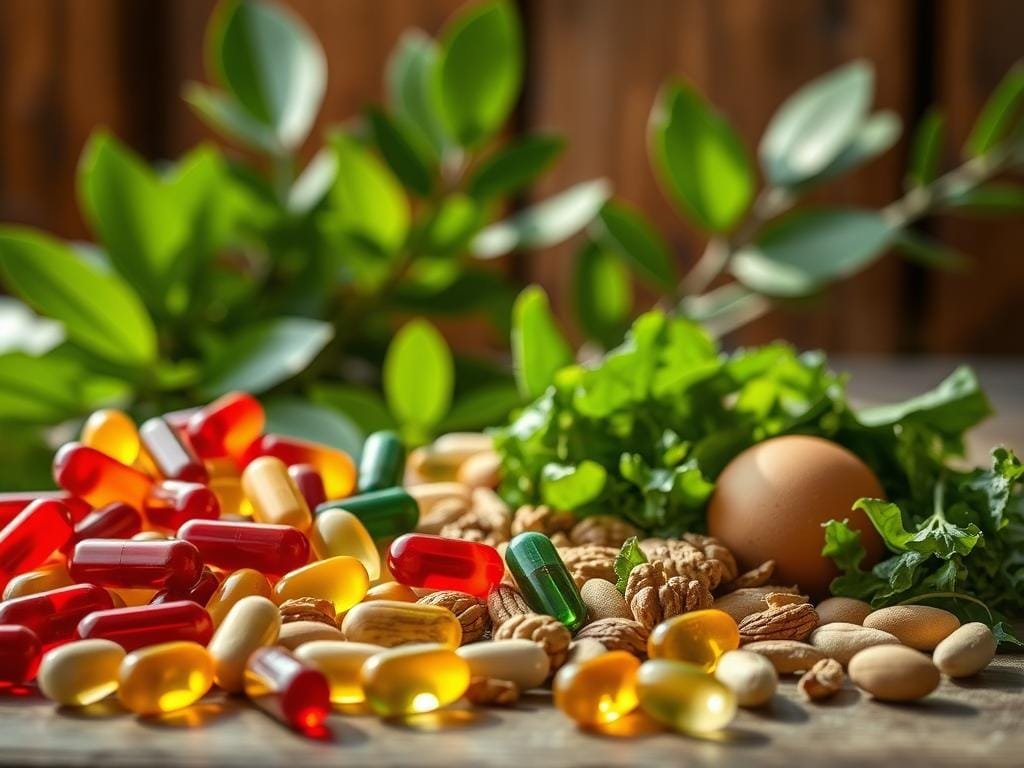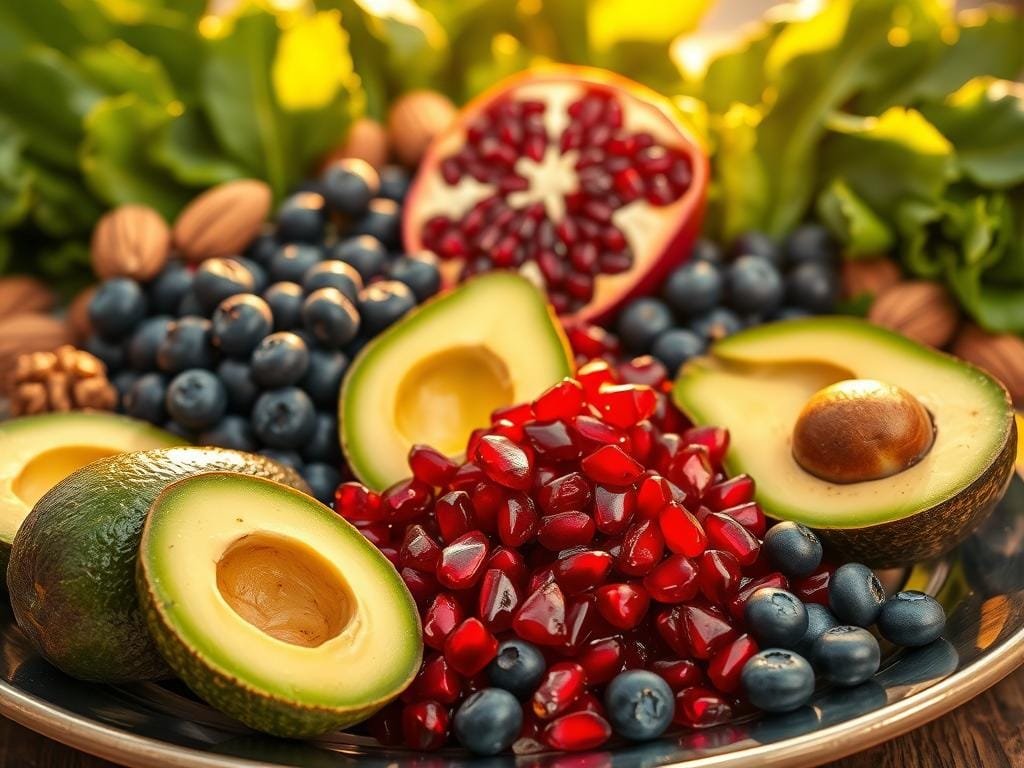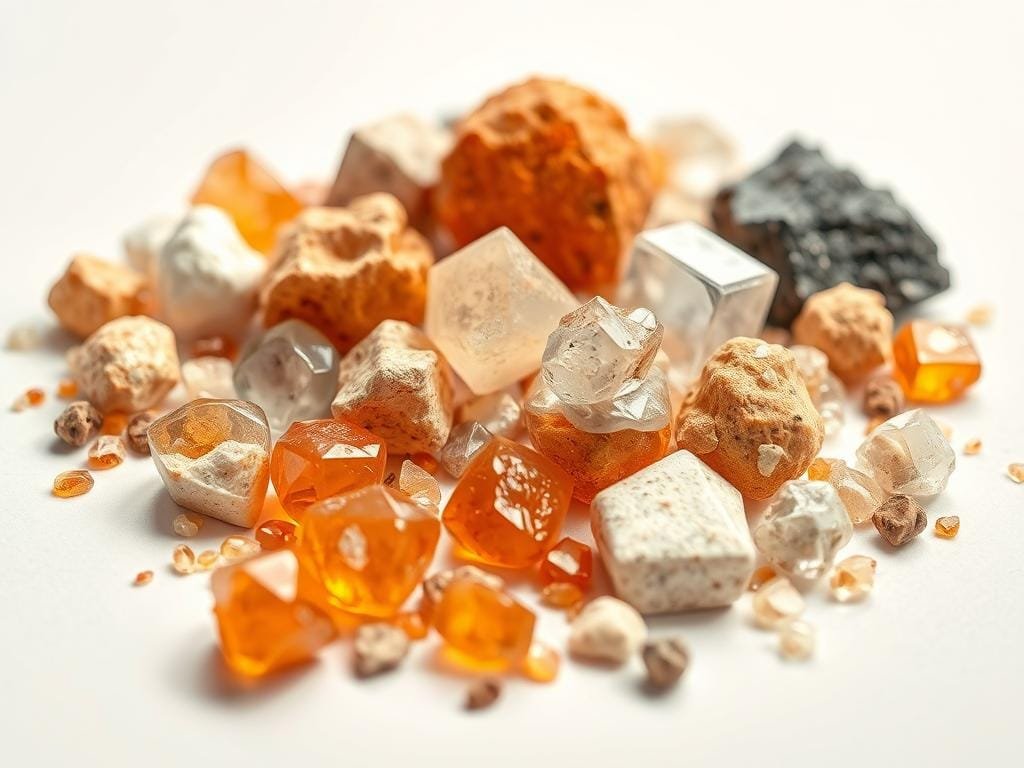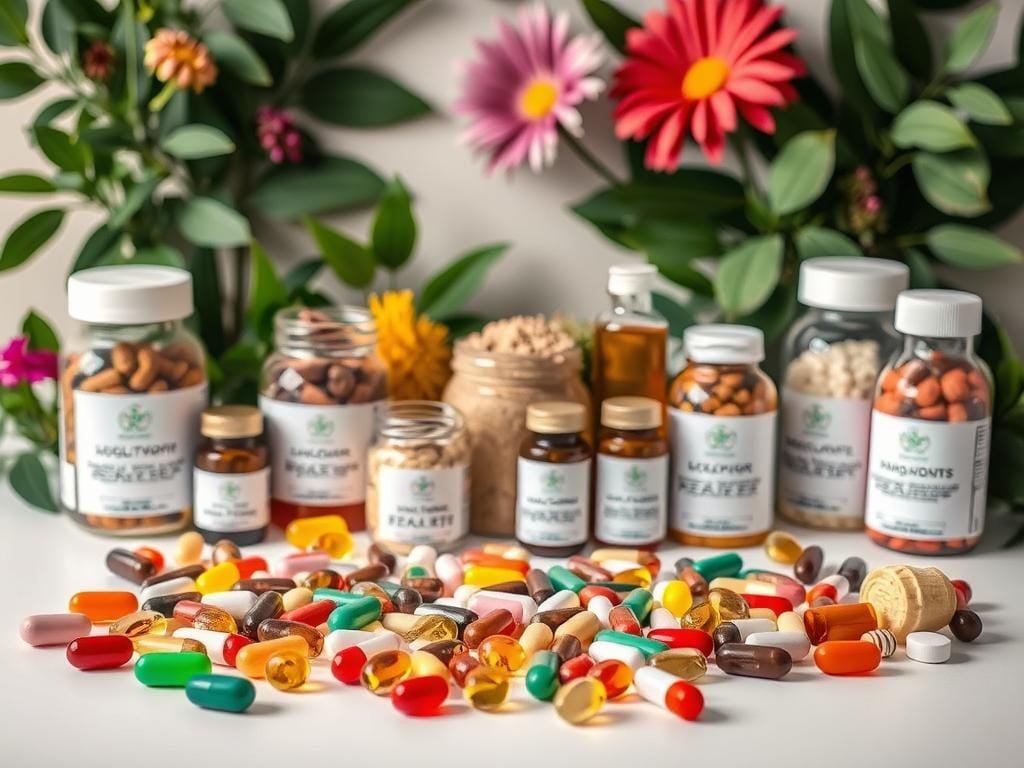Did you know your skin and hair health depends on your diet? Alain Michon, medical director at the Ottawa Skin Clinic, says, “Your skin and body will be a reflection of what you’re putting in your body.” This shows how vital beauty nutrition is for a glowing complexion and strong hair.
Eating a balanced diet full of vitamins for skin and minerals for hair can greatly improve your look. A diet good for your skin helps fight off environmental damage and boosts your health. For more on the key vitamins and minerals, check out this resource.
Table of Contents
Key Takeaways
- A healthy diet is key for skin and hair health.
- Essential vitamins and minerals are important for beauty nutrition.
- A balanced diet can lead to a radiant complexion and strong hair.
- Nutrition is linked to overall well-being.
- A healthy lifestyle protects against environmental stressors.
The Beauty-Nutrition Connection: What Science Reveals
Our diet has a big impact on our skin and hair health. It’s not just a saying; science backs it up. Eating right can make us look better, while bad diet choices can cause problems.
How Your Diet Directly Impacts Skin Cell Renewal
Skin cell renewal is key to our skin’s health. Nutrients are essential for this process. Foods rich in antioxidants and omega-3s help keep our skin healthy by fighting inflammation and promoting new cell growth.
A 2020 study found that a Mediterranean diet is good for hair loss. This diet includes lots of fruits, veggies, whole grains, and healthy fats. These foods are great for our overall health, including our skin.
| Nutrient | Role in Skin Health | Food Sources |
|---|---|---|
| Vitamin C | Boosts collagen production, improves skin elasticity | Citrus fruits, strawberries, bell peppers |
| Omega-3 Fatty Acids | Reduces inflammation, supports skin barrier function | Salmon, walnuts, chia seeds |
| Zinc | Supports wound healing, regulates oil production | Oysters, beef, chicken, pumpkin seeds |
The Hair Growth Cycle and Its Nutritional Dependencies
The hair growth cycle has three phases: anagen, catagen, and telogen. Nutrition is key for this cycle, mainly in the anagen phase. Lack of nutrients can slow down hair growth or cause loss.
“A well-balanced diet that includes essential nutrients like iron, zinc, and biotin is vital for healthy hair growth.” –
To grow healthy hair, eat foods rich in proteins, vitamins, and minerals. Adding nutrient-dense foods to your diet supports hair growth and health.
Essential Nutrients for Healthy Skin and Hair: Your Complete Guide
Healthy skin and hair start from within. Your diet is key to nourishing them. It’s important to eat the right nutrients.
Understanding Macro vs. Micronutrients for Beauty
Nutrients are divided into macronutrients and micronutrients. Both are important for skin and hair health. Macronutrients like carbs, proteins, and fats give energy and build skin and hair. Carbohydrates help make glycoproteins, which are good for skin.
Micronutrients include vitamins and minerals. They help with skin and hair health. Vitamins A, C, and E protect skin from damage. Katie Tomaschko, MS, RDN, says eating seafood with omega-3s is good for hair and skin.
How Nutrient Deficiencies Show Up in Your Appearance
Nutrient shortages can harm your skin and hair. For example, not enough vitamin C can cause skin problems. Lack of biotin and vitamin B can lead to hair loss and weak nails.
Knowing the signs of nutrient shortages helps you choose better foods. Signs include dry skin, brittle hair, and weak nails. Eating enough nutrients can prevent these issues and keep you looking and feeling great.
Vitamin A: Your Skin’s Renewal Catalyst
Vitamin A is key for your skin’s health. It helps keep your skin looking healthy and glowing. It does this by renewing and repairing skin cells.
Transforming Skin Cell Turnover
Vitamin A transforms skin cell turnover. It helps get rid of old skin cells and brings in new ones. This makes your skin look brighter and more even.
Retinol, a vitamin A derivative, is great for this. It’s in many skincare products. It goes deep into the skin to boost cell turnover.
Best Food Sources of Retinol and Beta-Carotene
To get more vitamin A, eat foods high in retinol and beta-carotene. Retinol is in animal products. Beta-carotene is in plants.
| Food Source | Retinol or Beta-Carotene Content |
|---|---|
| Sweet Potatoes | High in Beta-Carotene |
| Carrots | High in Beta-Carotene |
| Liver (Beef) | High in Retinol |
| Dark Leafy Greens (Kale, Spinach) | Rich in Beta-Carotene |
Recommended Daily Intake for Visible Results
The daily vitamin A need changes with age and sex. Adults usually need 700 to 900 micrograms a day. Eating a balanced diet with vitamin A is key for good results.
Eating foods like sweet potatoes and carrots helps your skin. Adding retinol sources like liver to your diet also boosts skin renewal.
B-Complex Vitamins: The Hair Growth Accelerators
B-complex vitamins are key for growing strong hair and keeping your scalp healthy. They help keep your hair, skin, and nails in top shape. These vitamins work together to support many body functions, including hair growth.
Biotin (B7): Why It’s Essential for Thick, Healthy Hair
Biotin, or Vitamin B7, is famous for its role in hair growth. It helps make keratin, a protein that’s a big part of your hair. Without enough biotin, you might lose hair, have brittle hair, or see slow growth. So, it’s important to get enough biotin for healthy hair.
Niacin (B3): Improving Scalp Circulation and Health
Niacin, or Vitamin B3, boosts blood flow to your scalp. This helps feed your hair follicles, encouraging healthy hair growth. It also keeps your scalp healthy, reducing hair loss risks.
Riboflavin, Folate, and B12: Supporting Hair Structure
Riboflavin (B2), folate (B9), and B12 are also vital for hair health. Riboflavin helps cells make energy, including in your hair follicles. Folate is key for cell growth, including hair cells. B12 helps make red blood cells, which carry oxygen to your scalp, aiding hair growth.

The way B-complex vitamins work together is what makes them so effective for hair growth. Getting the right mix of these vitamins can really improve your hair’s health and look.
| B-Complex Vitamin | Role in Hair Growth | Food Sources |
|---|---|---|
| Biotin (B7) | Keratin production, hair strength | Nuts, eggs, whole grains |
| Niacin (B3) | Scalp circulation, nourishment | Meat, fish, whole grains |
| Riboflavin (B2) | Energy production in hair follicles | Dairy, leafy greens, almonds |
| Folate (B9) | Cell growth and maintenance | Leafy greens, legumes, citrus fruits |
| B12 | Oxygen delivery to the scalp | Meat, fish, poultry, dairy |
Vitamin C: The Collagen-Boosting Powerhouse
Vitamin C is key for making collagen, which keeps your skin looking young and healthy. Knowing how vitamin C helps with collagen is important for better skin.
The Science Behind Vitamin C and Collagen Synthesis
Vitamin C is vital for making collagen. It helps enzymes that stabilize collagen molecules. This is why vitamin C is essential for strong skin, bones, and connective tissue.
Studies show vitamin C also makes skin more elastic and hydrated. Eating foods rich in vitamin C can make your skin smoother and less wrinkled.
Top Vitamin C-Rich Foods in American Markets
Finding vitamin C in your diet is easy with all the options in American markets. Here are some top sources:
- Citrus fruits like oranges, lemons, and grapefruits
- Berries, including strawberries, blueberries, and raspberries
- Kiwi, a small fruit packed with a high dose of vitamin C
- Bell peppers, which are rich in vitamin C and great in many dishes
- Leafy greens such as spinach and kale
You can add these foods to salads, smoothies, stir-fries, and even desserts.
Combining Vitamin C with Other Nutrients for Enhanced Benefits
Vitamin C is powerful alone, but even better with other nutrients. For example, vitamin C and vitamin E work together to fight off damage from the environment.
Here are some good combinations:
- Vitamin C + Vitamin E: Boosts antioxidant power
- Vitamin C + Zinc: Helps with immune health and healing
- Vitamin C + Omega-3 fatty acids: Good for skin health and reduces inflammation
Learning how to mix vitamin C with other nutrients can help you make a diet plan that’s great for your skin and hair.
Vitamin E and Antioxidants: Your Skin’s Protective Shield
Vitamin E and other antioxidants protect your skin from free radicals. These unstable molecules can harm your skin and speed up aging. Eating foods rich in antioxidants helps keep your skin healthy from the inside.

How Antioxidants Fight Skin-Damaging Free Radicals
Antioxidants, like vitamin E, fight free radicals. This reduces oxidative stress and keeps your skin looking young. Key antioxidants like vitamin C and beta-carotene also protect your skin cells.
By stopping free radicals, antioxidants keep your skin cells healthy. They help your skin stay strong and look better.
Best Food Sources of Vitamin E Available in the US
Eating foods high in vitamin E boosts your antioxidant levels. Some top sources in the US are:
- Nuts and seeds, such as almonds and sunflower seeds
- Vegetable oils, like wheat germ oil and sunflower oil
- Leafy greens, including spinach and broccoli
Walnuts are a big source of vitamin E. They’re a great snack for your skin.
Creating an Antioxidant-Rich Diet Plan
To get the most from antioxidants, eat a balanced diet. Include fruits, vegetables, nuts, and seeds. Tips for an antioxidant-rich diet are:
- Eat a variety of colors to get different vitamins and minerals
- Choose whole foods over supplements
- Use gentle cooking methods to keep nutrients in your food
By following these tips, you can protect your skin and stay healthy.
Essential Fatty Acids: The Secret to Moisturized Skin and Shiny Hair
Essential fatty acids are key nutrients for healthy skin and hair. They are not made by our bodies and must come from food or supplements.
Omega-3s: Supporting Skin Barrier Function
Omega-3 fatty acids, like EPA and DHA, are important for skin health. They reduce inflammation and help skin cells grow. You can find them in salmon, mackerel, and sardines.
Balancing Omega-6s and Omega-9s
Omega-3s are vital, but so are omega-6s and omega-9s. Omega-6s, found in nuts and seeds, are good for skin. Omega-9s, in olive oil, keep skin elastic. A mix of these fatty acids is essential for healthy skin and hair.
EFA-Rich Foods for Your Shopping List
Adding EFA-rich foods to your diet is easy. Here are some top picks:
| Food | EFA Content | Benefits |
|---|---|---|
| Salmon | Rich in Omega-3s | Reduces inflammation, promotes healthy skin |
| Walnuts | Rich in Omega-6s | Supports skin health, improves hair texture |
| Olive Oil | Rich in Omega-9s | Maintains skin elasticity, moisturizes hair |
For more on supplements for skin and hair health, check out The Truth About Effective Natural Supplements.
Critical Minerals That Transform Your Appearance
Discover the secret to glowing skin and beautiful hair. Your body needs certain minerals to stay healthy. Without them, your skin, hair, and nails can suffer.

Zinc: Controlling Oil Production and Supporting Hair Growth
Zinc is key for healthy skin and hair. It controls oil, preventing acne. It also helps hair grow by fixing damaged follicles.
Eating foods like oysters, beef, and chicken boosts your skin and scalp health. This makes your appearance better.
Iron: Preventing Hair Loss and Boosting Skin Radiance
Iron is vital for beauty. It stops hair loss by keeping follicles oxygenated. Without enough iron, your skin and hair may look dull.
Eating red meat, spinach, and lentils helps. They keep your skin bright and hair strong.
Selenium and Silica: The Unsung Heroes of Beauty Nutrition
Selenium fights off skin damage from free radicals. It keeps your skin elastic and young-looking. Silica is great for skin, hair, and nails.
It makes your skin moist, hair strong, and nails healthy. Adding Brazil nuts and oats to your diet can make you look better.
Adding zinc, iron, selenium, and silica to your diet can change how you look. They help your skin glow and your hair grow strong.
Protein: Building Beautiful Hair and Skin From Within
Protein is key to having beautiful hair and skin. It’s a nutrient that helps build these parts of our body. Our bodies can’t make all amino acids, so we need to eat them.
Complete vs. Incomplete Proteins
Proteins are either complete or incomplete. Complete proteins have all the amino acids we need. Foods like eggs, dairy, fish, and meat are complete proteins. Incomplete proteins are missing some amino acids. Most plant foods are incomplete proteins, but mixing them can make a complete protein.
Eggs are a great protein source. One extra-large egg has almost seven grams of protein. Eating a variety of proteins helps keep your hair and skin healthy.
Plant-Based Protein Sources for Vegans and Vegetarians
Vegans and vegetarians have many plant-based protein options. Some top choices are:
- Legumes (lentils, chickpeas, black beans)
- Nuts and seeds (almonds, chia seeds, hemp seeds)
- Whole grains (quinoa, brown rice, whole wheat)
- Soy products (tofu, tempeh, edamame)
Mixing these foods ensures you get all amino acids. For example, whole grains with legumes or nuts with seeds are good combinations.
Calculating Your Personal Protein Needs for Beauty Goals
Your protein needs vary based on age, sex, weight, and activity level. Adults need about 0.8 grams of protein per kilogram of body weight daily. If you’re active or want to improve hair and skin, you might need more.
To figure out your protein needs, think about your beauty goals and activity level. For example, if you want to grow your hair or keep your skin healthy, you might need more protein. For more detailed guidance, check out essential nutrients and calories for adults.
Knowing your protein needs and eating a variety of protein-rich foods helps achieve your beauty goals from the inside out.
Supplements vs. Whole Foods: Making Smart Choices
When it comes to beauty from within, knowing the difference between supplements and whole foods is key. Whole foods give you a wide range of nutrients. Supplements, on the other hand, target specific beauty needs.
When Supplements Make Sense for Skin and Hair Health
Supplements are great when your diet is missing certain nutrients. They’re also good for specific beauty goals, like growing hair or making skin more elastic. For example, if you’re vegan or follow a strict diet, supplements like biotin or vitamin B12 can help.
Alain Michon says supplements should add to your diet, not replace it. They work best when used with whole foods to boost health and beauty.
Top-Rated Beauty Supplements Available in the US Market
The US has many beauty supplements to choose from. Some of the best include:
- Omega-3 fatty acid supplements for skin hydration
- Biotin supplements for hair growth
- Vitamin C supplements for collagen production
When picking a supplement, choose reputable brands with high standards.
| Supplement | Benefit | Recommended Brand |
|---|---|---|
| Omega-3 | Skin hydration | Nordic Naturals |
| Biotin | Hair growth | Nature’s Bounty |
| Vitamin C | Collagen production | Garden of Life |
How to Evaluate Supplement Quality and Effectiveness
To get a good supplement, look for third-party tests from NSF International or ConsumerLab.com. They check if the supplement is strong and pure.
Also, make sure the label is clear about dosage and ingredients. Stay away from supplements with extra fillers or additives.

By being smart and informed, you can choose the right supplements for your beauty goals. This way, you’ll get the best results.
Hydration and Electrolytes: The Foundation of Skin Radiance
Hydration and electrolyte balance are key to healthy skin. They help keep your skin looking its best. Drinking enough water is important, but so is keeping the right balance of electrolytes.
Water’s Critical Role in Cellular Health and Skin Plumpness
Water is essential for your skin cells. It keeps your skin elastic and firm. Drinking water and eating water-rich foods like cucumbers and watermelon can help.
Electrolyte Balance for Optimal Nutrient Delivery
Electrolytes like sodium and potassium are important for your body’s fluids. They help your nerves and muscles work right. They also help your skin get the nutrients it needs. An imbalance can cause dehydration and harm your skin. Learn more at Boost Healthy Life.
Hydration Strategies Beyond Plain Water
Drinking water is just the start. You can also use electrolyte-rich drinks or supplements. Eating fruits, vegetables, and whole grains can help keep you hydrated and give your skin what it needs.
| Hydration Method | Description | Benefits |
|---|---|---|
| Drinking Water | Consuming adequate amounts of plain water | Maintains skin hydration, supports cellular health |
| Water-Rich Foods | Eating foods with high water content like cucumbers and watermelon | Contributes to overall hydration, provides essential nutrients |
| Electrolyte-Rich Beverages | Consuming beverages that contain electrolytes like sodium and potassium | Helps maintain electrolyte balance, supports nutrient delivery to skin cells |
For more on hydration and health, check out studies on PMC.
Conclusion: Creating Your Personalized Beauty Nutrition Plan
Now that you know the key nutrients for healthy skin and hair, it’s time to make your own beauty nutrition plan. Eating a balanced diet with lots of whole foods is key. This will give you the nutrients your skin and hair need.
Think about what you like to eat, your lifestyle, and what you want to achieve in beauty. Add foods like leafy greens, berries, fish, avocado, and walnuts to your meals. Try to cut down on sugary snacks, dairy, fried foods, processed foods, and alcohol.
Choosing the right foods can help your skin and hair health. Start with small changes and see how your body reacts. With a bit of planning and creativity, you can make a nutrition plan that meets your beauty goals.

